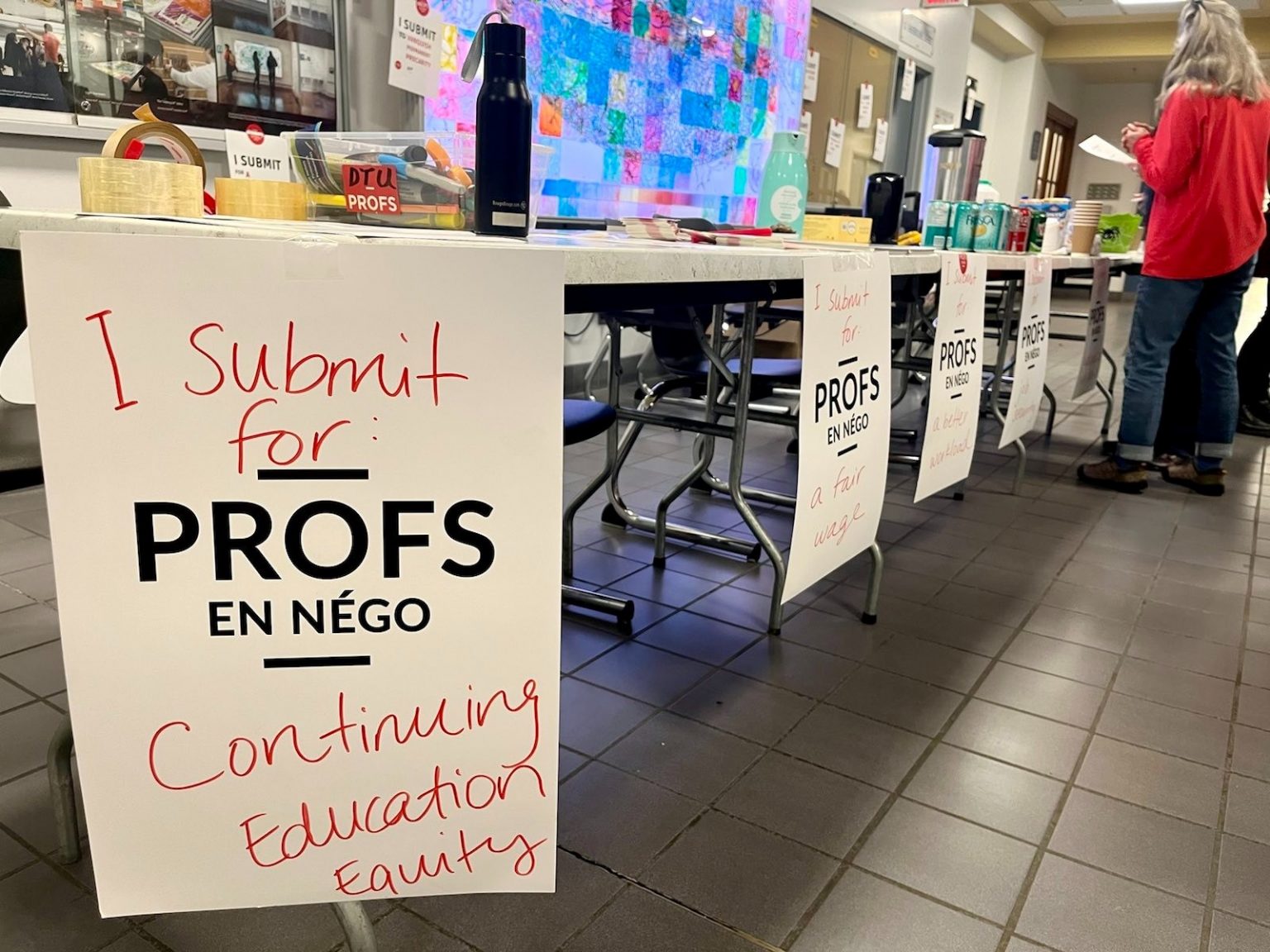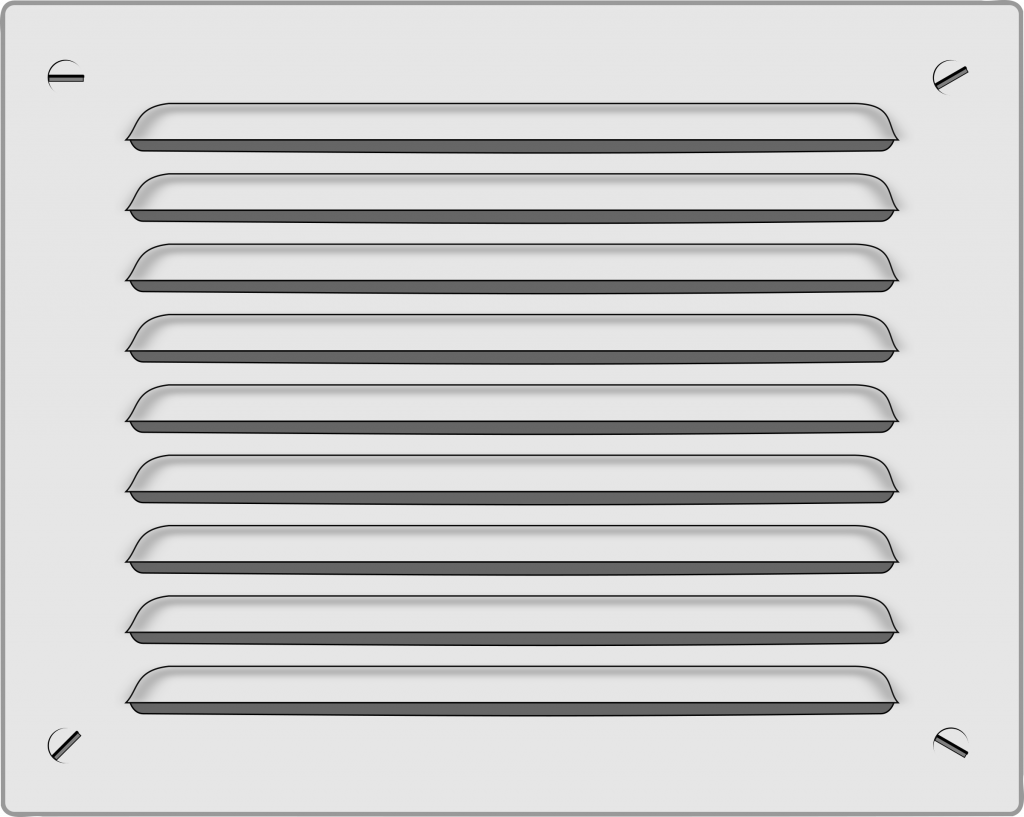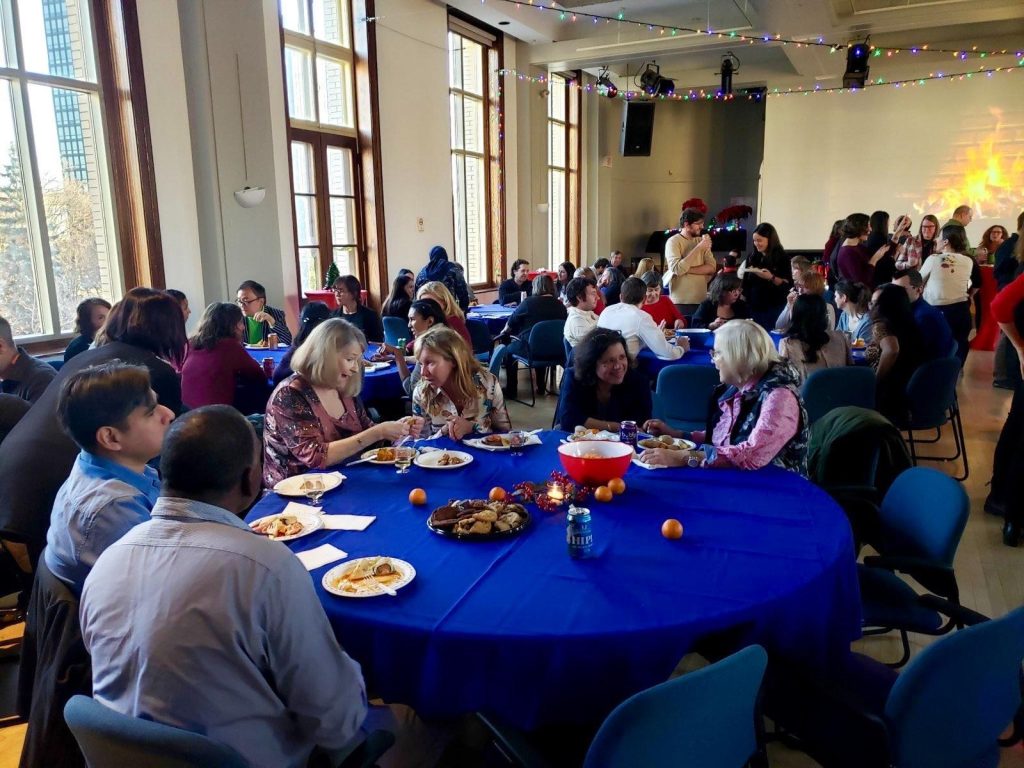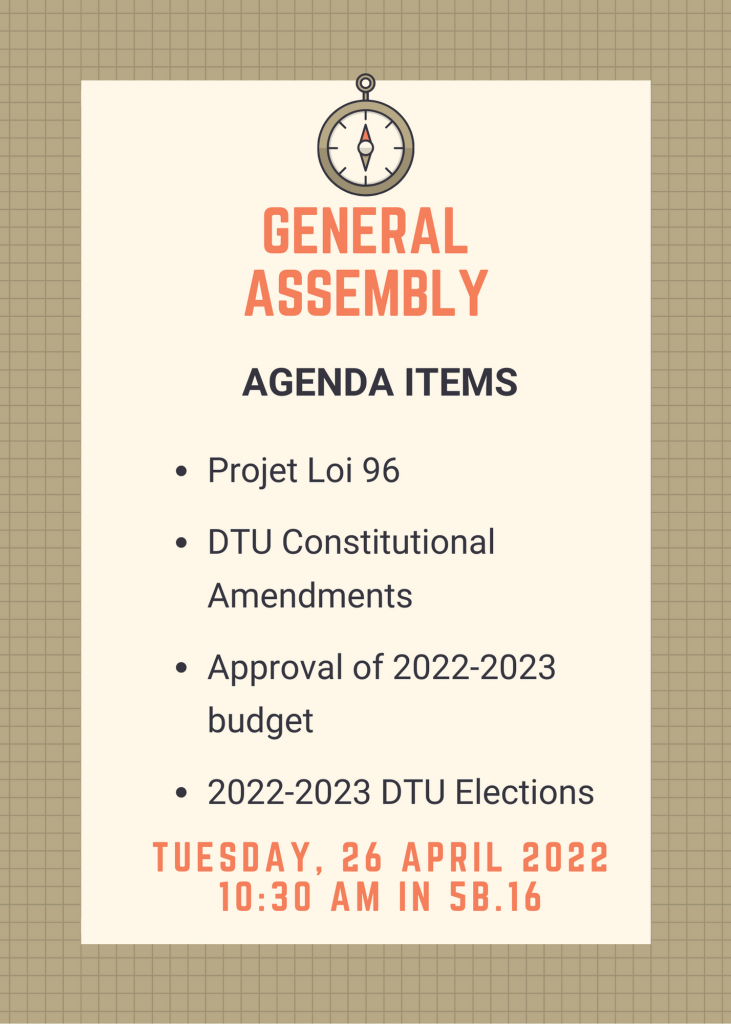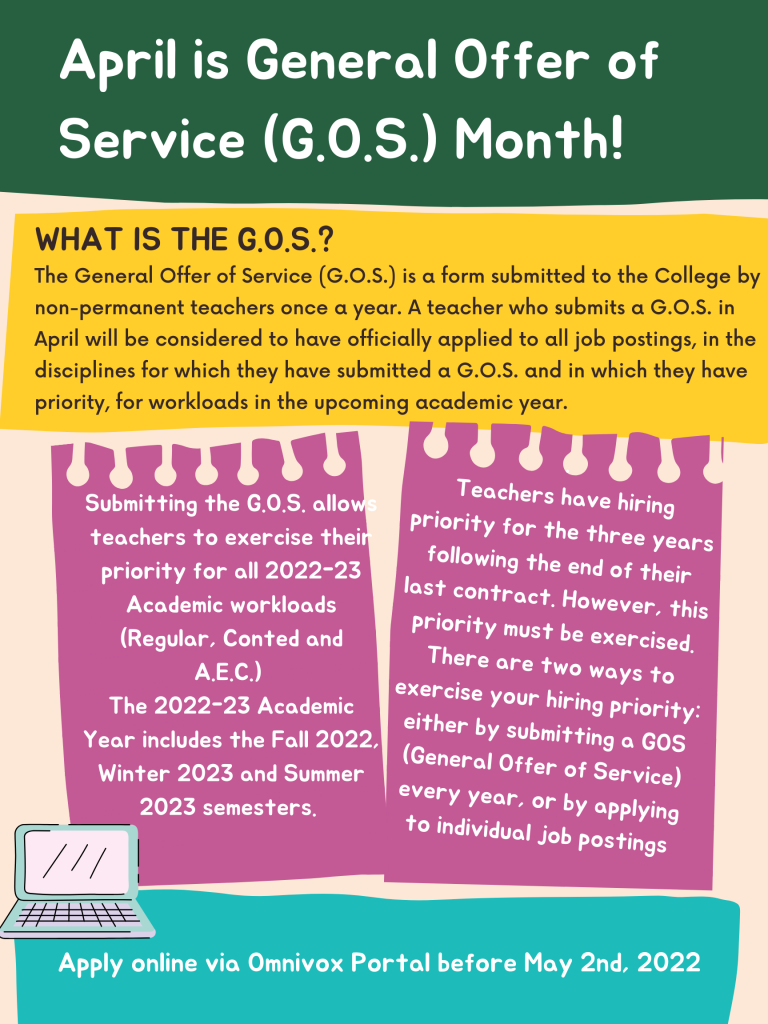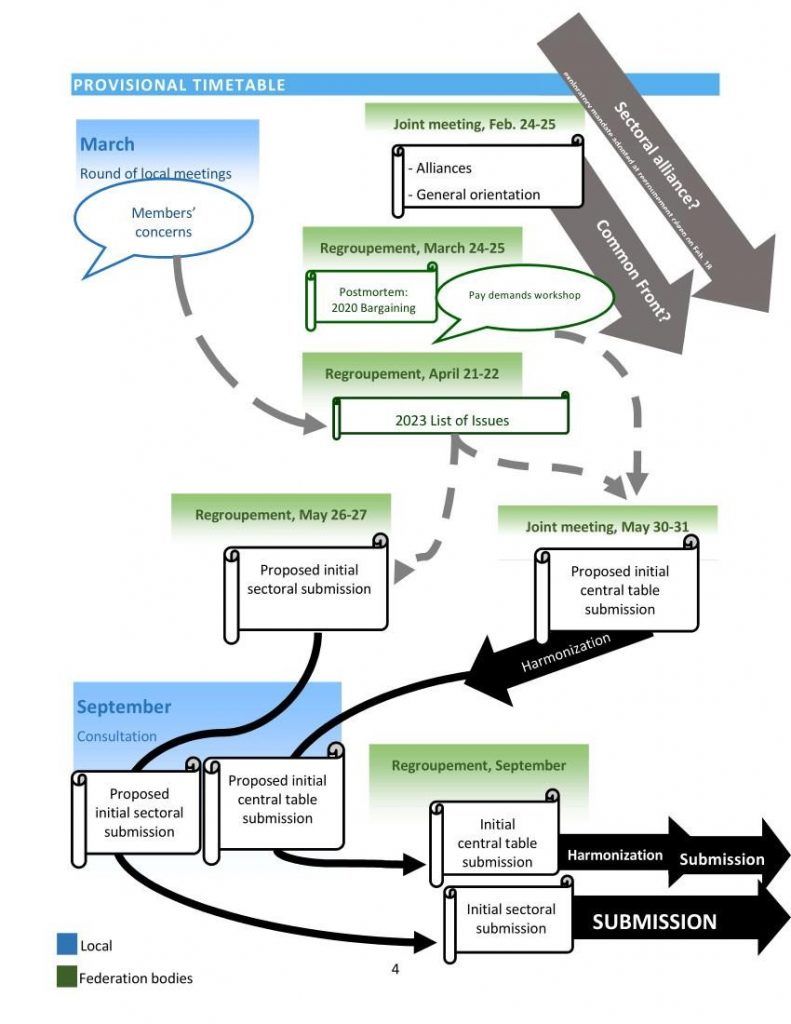
The DTU Executive
Louisa Hadley, President
President@dtu.qc.ca
Brian Seivewright, VP Internal
VPInternal@dtu.qc.ca
Mélanie Beck, VP External
VPExternal@dtu.qc.ca
Antonia Fikkert, Secretary-Treasurer
Secretary_Treasurer@dtu.qc.ca
Emilie Richer, Grievance Officer
grievanceofficer@dtu.qc.ca
Administrative Assistant
Elisabeth Leone
Elisabeth@dtu.qc.ca
DTU email: dtu@dtu.qc.ca
In this issue:
Semester Round-Up by Mobilization Coordinator Adam Bright
Invite the DTU to your department meeting!
Final Grade Deadline
Teacher Availability
Important message for non-permanent teachers
Administrative overreach on pedagogical concerns
Know Your Rights : Grade Review Committees
EDIA training
Non-Permanent Teachers: When is the workload official?
DTU Summer Hours
Semester Round-Up by Mobilization Coordinator Adam Bright
We’ve had a full slate of mobilization activities this semester. Over the past few months, we’ve used the info booth to distribute hundreds of négo t-shirts, stickers, hats, badges, pins, lanyards, tote bags…and donuts, macaroons, cupcakes, and hamantaschen. We came together to mark the expiration of our Collective Agreement in a funerary commemoration. We’ve paraded down the hallways making righteous noise to show the administration that we’re prepared to fight for a fair contract. Just last week, we handed out 2000 Timbits to Dawson students taking the English Exit Exam, emphasizing the common interests of students and teachers as we fight to protect higher education in Quebec. We’ve also spoken with hundreds of DTU members about precarity, salaries, the paltry government offers -peanuts!- , and our collective hopes for the next contract. If the government doesn’t make a realistic offer over the summer, we may well have to intensify the pressure next semester. We’re looking forward to seeing each and every teacher joining in solidarity.




Invite the DTU to your department meeting!
If you’ve been following the négo news, you will know that it seems highly unlikely that negotiations will be settled over the summer. Although it feels a while away, we are starting to think ahead for mobilization and pressure tactics for the Fall. As part of this, we are offering to come to department meetings at the beginning of the Fall semester to discuss negotiations and hear from members about possible next steps. We know that the first meeting of the semester is often a busy time, but we encourage you to consider including us on your Agenda.
Final Grade Deadline
Teacher Availability

The deadline for all teachers to submit final grades is June 2. This deadline is the same whether you teach day courses or Continuing Education courses, and whether or not your course includes a final exam in the final examination period.
Important message for non-permanent teachers
We encourage you to consult the DTU before you refuse any workload you have been offered. Refusals can have a substantial impact on your future hiring priority. Teachers who would like to learn more about seniority, priority, and workload distribution are welcome to stop by the DTU office in room 8A.11, or to send us an email at dtu@dtu.qc.ca.
For teachers with a day contract or a cont’ed charge, the last day of availability is June 14. The vacation period is from June 15 to August 16, inclusive. Teachers are expected to be available to the College until the vacation period begins. Although the nature of our work alters after classes end, teachers are expected to fulfil any departmental obligations as well as to be available to attend meetings with the College if required. For full-time teachers, availability is 32.5 hours per week. For part-time teachers, availability is proportional to the workload.
Teachers who wish to be unavailable to the College prior to the beginning of the vacation period, or after the end of the vacation period, can request a transfer of availability. You need to complete the form provided by the College in advance of the period you are transferring. Note that the form asks teachers to indicate what activities you propose to make up for the period of unavailability; you do not have to provide too much detail here. It is sufficient to indicate something along the lines of “course prep” or “departmental work”. If you perform tasks such as answering MIOs during your transfer of availability, you can ask your Dean to reduce the time that you owe back to the College in availability.
Administrative overreach on pedagogical concerns
This semester there have been several concerning instances of administrators interfering in pedagogical decisions that we consider to be the prerogative of departments and teachers.
In response to the adoption of the Blended Learning policy at senate in February, several departments engaged in discussions about how to proceed. The English department held a special meeting dedicated to this topic, the outcome of which was that a motion was passed stating: The Department of English will continue to discuss blended learning but will not allow any blended courses in the 2023-2024 academic year. In response to this motion, Dean Cole sent an email to all members of the English Department stating that the Blended Learning Policy is a College policy and that the department had a responsibility to review proposals. The College’s position seems to be that an individual teacher can apply to teach a Blended Learning course, even if their department is not in agreement, and that it is the Sector Dean who decides whether to approve the proposal. The DTU’s position is that such pedagogical decisions belong to departments and that faculty members are expected to abide by departmental policies. We feel that it sets a dangerous precedent to suggest that the Sector Dean can determine which members of a department have to follow which departmental policies.
More recently, a Sector Dean instructed a teacher to alter their assignment parameters despite the fact that the assessment was already in process. In response to an increase in plagiarism on initial assessments, the teacher decided to alter the parameters of the final assessment from an at-home assignment to an in-class assignment spread over several classes. The teacher informed the students several weeks in advance of the assignment and received no feedback. Subsequent to the first class of the assignment, the teacher received a MIO from their Sector Dean stating that they had been made aware of the change by a student. The Dean stated that they considered the change to be a substantive change to the Course Outline and that according to ISEP any substantive change requires approval from the department coordinator and the Sector Dean’s office. However, there is no clear information provided to faculty regarding what the College considers to be a substantive change requiring “approval” from the Dean. Moreover, after discussing the issue with the teacher in question and several of their department colleagues, it does not appear that this is considered to be a “substantive change” by the disciplinary experts. We have brought this issue to the College.
We advise you to prepare your Course Outlines in such a way as to allow for adjustments over the course of the semester in response to pedagogical need
Know Your Rights
Grade Review Committees
As the Final Grade deadline approaches, we feel it is important to remind teachers of the process for grade reviews. While students’ rights and responsibilities regarding grade reviews are set out in ISEP, the Grade Review Committee is part of our Collective Agreement.
Before a student requests a grade review, they should be encouraged to discuss the situation with their teacher. A student can request a grade review only once the final grade for the course has been submitted to the College. The student’s request must be submitted to the relevant Sector Dean within 30 calendar days of the official grade deadline of the semester. The Dean determines whether to grant a grade review request from a student, and in the event that the request is granted, they contact the department to ask that a Grade Review Committee be convened.
A few things to keep in mind about how the Grade Review Committee functions:
- It is an independent committee; the administration has no authority over how the committee functions.
- It is composed of three teachers from the discipline, one of which is the teacher responsible for the original evaluation.
- The committee determines among itself how it wishes to function; for example, whether to meet in person, whether to make its decision via email, the distribution of tasks among committee members.
- The committee determines whether or not it feels it is necessary to meet with the student; the student has an obligation to present their case along with supporting evidence as part of the request process.
- The committee communicates its decision to the Dean; the committee can determine to increase, decrease or maintain the original grade.
- The decision of the Grade Review Committee is final.
EDIA training
The College’s Local Advisory Committee on Equal Access to Employment, which is meant to work to redress underrepresentation of minority groups in the employee population, held its first meeting of the semester only on May 19th. Meanwhile, departments continue to push for more equity, diversity, inclusion, and accessibility measures at Dawson. You don’t need to wait for the College to act! The Department of Sociology and Political Science recently secured funding from the College for an EDIA workshop designed for them by an external facilitator. Reach out to dtu@dtu.qc.ca if your department is interested in doing something similar.
We sent the DTU Equity and Diversity Committee’s Departmental Toolkit to all members on April 27th, 2023 – we encourage you to check it out for other suggestions to improve equity in your department.
Non-Permanent Teachers: When is the workload official?
Although you may have been informed of your workload by your coordinator, it is important to know that this workload is only provisional. The official confirmation of workloads is done by Human Resources once they have received the information regarding possible incoming MEDs. The official confirmation usually happens in July and will be subsequently communicated to you.
What is a MED?
Our Collective Agreement includes protections for permanent teachers when there is not a full-time workload available at their College. Teachers in these situations are referred to as MEDs (mis en disponibilité). When a teacher becomes a MED it may result in them having priority to teach in another College.
If there is a full-time workload available at Dawson, MEDs from another College will have priority over non-permanent teachers at Dawson in certain circumstances.
If you would like more information about MEDs the FNEEQ has an explanatory guide that can be downloaded here.






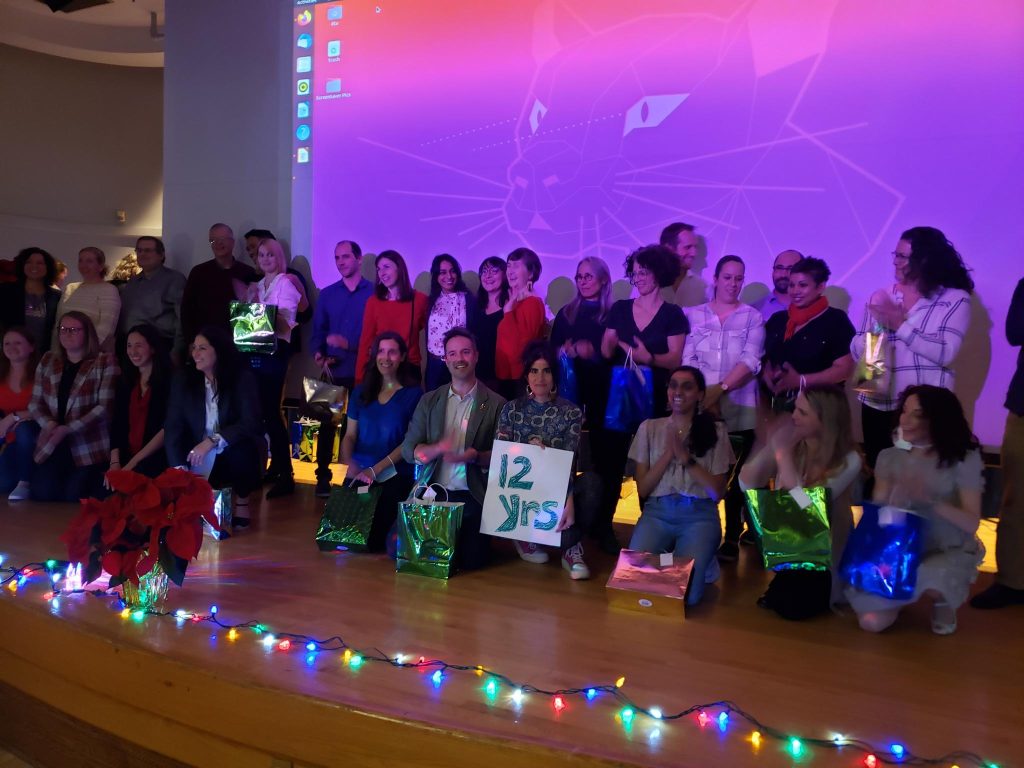


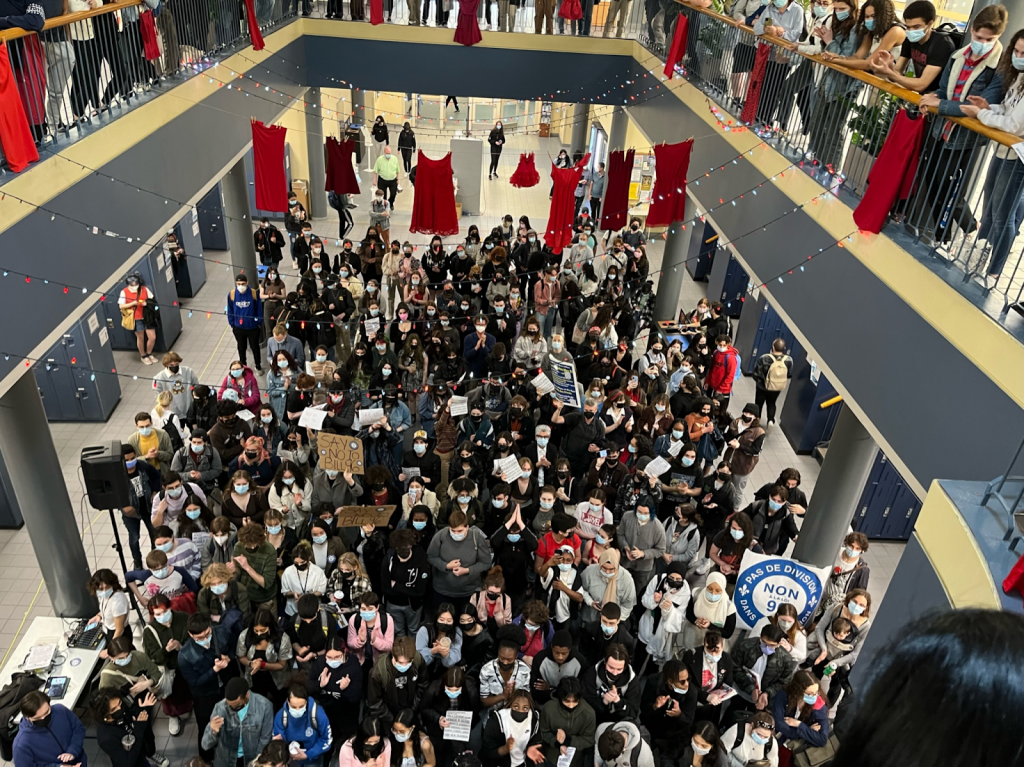
 The protest opened with several speeches from organisers of Anglophone community groups, political leaders, and Indigenous representatives. The speeches highlighted the detrimental impacts of the proposed law, both in terms of the impacts for education as well as more broadly for access to health and legal services. Reports on the protest appeared in both Francophone and Anglophone media outlets, such as
The protest opened with several speeches from organisers of Anglophone community groups, political leaders, and Indigenous representatives. The speeches highlighted the detrimental impacts of the proposed law, both in terms of the impacts for education as well as more broadly for access to health and legal services. Reports on the protest appeared in both Francophone and Anglophone media outlets, such as Since then, the College has continued to be conservative in its approach to granting leaves. Although the College has not officially declared a change in its policies concerning anticipated sabbatical leaves and gradual retirement, there has been a clear change in practice. In all recent cases, teachers asking for an anticipated sabbatical or gradual retirement plan to take place over a period of five years have been declined, and only requests taking place over a shorter period have been approved.
Since then, the College has continued to be conservative in its approach to granting leaves. Although the College has not officially declared a change in its policies concerning anticipated sabbatical leaves and gradual retirement, there has been a clear change in practice. In all recent cases, teachers asking for an anticipated sabbatical or gradual retirement plan to take place over a period of five years have been declined, and only requests taking place over a shorter period have been approved. 



